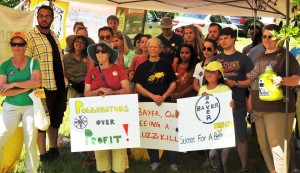by Abigail Benjamin ’18
This summer I am interning with Environment North Carolina. I work at their office in Raleigh, a city I was previously unfamiliar with, despite being a North Carolina resident. I work with four other interns, all of whom attend various East Coast colleges and universities. My daily routine is nonexistent; every day holds something different. While my overall week generally looks the same – Mondays spent in the office, Tuesdays spent phonebanking until 7PM, Wednesdays spent petitioning at the farmers’ market, Thursdays spent at the field office, and Fridays spent wrapping up the week’s work and planning for the next week – each day has a different schedule, which could change with a minute’s notice.

I have a wide range of duties, but my favorites are the ones that involve the most responsibility. Our first real project was to assist a partner organization, Toxic Free NC, with their Save the Bees Rally and Press Conference. The project involved 500 petition signatures, hours of phonebanking, and a day of poster-making. It wasn’t anything difficult, but the experience prepared us for the rest of the summer. Currently, the other interns and I are planning four campaign events, at least two of which will involve a press conference. Having no previous event planning experience, this has proved challenging but fun. Basically, planning an event for Environment North Carolina involves contacting local governments, farmers, coalition partners, media, and businesses and lots of phonebanking, emails, and confirmation calls.
The other interns and I mostly work in groups while meeting individual goals, but I have been given two personal initiatives so far. The first is to assist with the release of our state report on pollution caused by Concentrated Animal Feeding Operations, specifically Smithfield Foods’ hog operations in North Carolina. I am working with our state director and a Sierra Club employee to release this report and hold a Telepresser media brief. My second initiative is to train canvassers on how to write letter-to-the-editors and edit their letters each week.
I write a lot of letter-to-the-editors, usually at least one per week per active campaign. As an intern group, we have published at least one letter a week. My first letter was published in the Charlotte Observer, where they ran the letter alongside my most professional selfie. In hindsight, I should have attended the Career Fair when they were taking pictures for LinkedIn profiles.
The most exciting part of this internship so far has been when we go to the NC General Assembly. The first time, we delivered seismic blasting fact-sheets to legislators and asked them to sign on to a letter drafted by Representative Harrison addressed to Secretary Jewel, urging the Department of the Interior to deny all applications for seismic blasting permits on the Atlantic coast. I was able to speak to a number of legislators, including my own representative, Larry Pittman.
The second time I went to the General Assembly was when we tried to watch a vote on a particularly troubling bill that was disguised as environmentally friendly but would actually delay the cleanup of Duke Energy’s coal ash sites. The bill had already passed the Senate but still had the potential to be stopped by the House. I say we tried to watch the vote because we were not successful – the vote was pushed so far back in the day that we could not stay. Unfortunately, the bill ended up passing 82-32, much to the dismay of the Southern Environmental Law Center, Appalachian Voices, and Environment North Carolina.
Currently, I am looking forward to the Beach Days of Action that two other interns and I are planning. These Days of Action will take place on three different North Carolina beaches and will attempt to educate the public on the dangers of seismic blasting as well as create a platform for local advocates and citizens to voice their concerns about seismic blasting through signing petitions and tweeting photo petitions to President Obama. We will be hosting press conferences at two of the beaches, featuring remarks from coalition partners and – fingers-crossed – a Duke University researcher and the mayor of Kure Beach.


